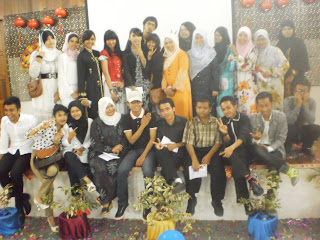all about BEL 120
Friday, April 15, 2011
Wednesday, April 13, 2011
Thesis statement
DEFINITION
A thesis statement is a complete sentence
that contains one main idea. This idea controls
the content of the entire essay. A thesis
statement that contains subpoints also helps a
reader know how the essay will be organized.
Look at the introductory paragraph below. See
if you can identify the thesis statement and
subpoints.
EXAMPLE OF THESIS STATEMENT
When I was young,I always knew that I wanted to become a teacher someday.
When played,would often gather my dolls together and pretend to teach them
how to do math problems or how to read a book.As I grew older,my desire to
become an ESL teacher became clearer as I did some volunteer teaching
overseas and in the United States.As I look back on my reasons for becoming
a teacher,there are three reasons that stand out.They are my love for the
English language,my innate interest in how people learn, and my desire to help
other people.
KEY FEATURES
ü states the main idea of the essay in a complete
sentence, not in a question.
ü is usually at the end of an introduction
ü states an opinion or attitude on a topic. It doesn't just
state the topic,itself.
ü often lists subtopics.
ü does not directly announce your main topic.
Tuesday, April 12, 2011
writing
“I am tired of being poor, this is humiliating.” A young girl said to herself. She never asked for this poverty fate. She was born in a poor family. She could not own anything that other teens have. I am that young girl. This poverty stopped many people from achieve their dreams. Apart from that, many of these unfortunate teens do not know that they can seek help to improve their life. However, with the government’s assist, poverty can be improved by using these few ways.
One of the ways for government to reduce poverty among poor people is by giving their children’s education. As we know, education is an essential towards bright future so by giving them the opportunity to learn, they will be able to improve their life. For example, the government provides free text books and school needs to reduce their parent’s burden instead of buying those things. Other than that, the government also provides scholarship to those poor university students. Scholarship makes student’s life easier as a large amount of money need to be invested in education nowadays. Hence, the rate of poverty among poor people can be decreased through education.
Besides that, government also take care of poor people through their economy welfare by giving them the jobs opportunity and donations. Usually, jobs opportunity is given based on their education level in order to increase their family’s income rate. However, in order to help the poors, the government also contributes donations such as money, food, and clothes. These necessary things help them to reduce their burden to live their life. Thus, economy welfare is one of the major steps to be taken by government to reduce the poverty among poor people.
Last but not least, poverty can be improved by giving motivation as a self-improvement. The government can conduct a motivation that can change people’s perception towards poverty. This motivation contains activities that improved their poverty life such as involve in agriculture business. Apart from that, the government can help by giving them some additional capital to start their own business. Besides that, teenagers should not think that they are troubling their parents by going to school and asking for educational money. Instead, those teenagers should realize that only education can improve their life better. Therefore, we must use wisely all the contribution that has been made by the government and no matter what, we must set in our mind that this life can be change if we have some effort.
In a nutshell, poverty can be improved by using lot of ways and the poors should not give up in order to achieve their own dreams. Our society can live much better than yesterday if they know how to use the benefits that had been given from the government. Government should play an important role to curb this poverty issues among our community. Not just that, we should not underestimate and categorize people based on their ways of life. Instead, we should think ahead in order to change our life’s fate.
preposition
show where something is
in, at, on, by, next to, beside, under, above
show the concept of time or duration of time
on, in, at, since, for, to, till, until, by, before
show how something moves in relation to other things
across, into, onto, through, to
in, at, on, by, next to, beside, under, above
show the concept of time or duration of time
on, in, at, since, for, to, till, until, by, before
show how something moves in relation to other things
across, into, onto, through, to
conjuction
are words used to link words, phrases, clauses or sentences
- to express addition - and, as well as
- to express choice - or, otherwise
- to express cause and effect - because, as
- to express time - when, while
- to express condition - if, unless
- to express contrast - although, but
adverbs
function :
- tells us more about a verb
- tells us more about an adjective
- tells us more about another adverb
- most adverb are usually formed by adding '-ly' to an adjective
- some adverb do not end with '-ly'
- can be used both as adjectives and adverb without change in form
- shows the frequency of how things are done
- can be used in the comparative and superlative forms
adjectives
function :
- describes more information about a noun or pronoun
- express quantity
- point out things or people
- formed using the '-ing' of a word
- formed using the '-ed' of a word
- nationalities can be used as nouns
- to compare two people or things
- to compare three or more people or things
- before nouns
- after the verb 'to-be'
- after intransitive verb
subject verb agreement
the 3rd person singular countable noun takes a singular verb
all other nouns take a plural verb
1st person
2nd person
3rd person
all verbs in the simple present tense which come after i, we, you and they must have an -s, -es or -ies
all verbs in the simple present tense which come after i, we, you and they must be in their base forms
- the little girl likes to eat sweet and chocolate
all other nouns take a plural verb
- the climbers climbs the tree as a form of exercise
1st person
- singular - i
- plural - you
2nd person
- singular and plural - you
3rd person
- singular - he, she, it
- plural - they
all verbs in the simple present tense which come after i, we, you and they must have an -s, -es or -ies
all verbs in the simple present tense which come after i, we, you and they must be in their base forms
verbs
action verbs
- regular - end in '~ed'
- irregular - end in other way than '~ed'
- transitive - require an object
- intransitive - do not require an object
- linking verb - join the subject to the rest of sentence
- 'be' verb - am, is, are, was, were
- auxiliary verb - can,could, will, would, should
- to express ability
- to express possibility
- to express permission
- to express advice
- to express necessity
determiners
quantity words
countable
uncountable
demonstratives
countable
uncountable
countable
- singular - one, every, each, another
- plural - many, several, some, a few
uncountable
- singular - much, more, some, a little, a lot of, all
demonstratives
countable
- singular - this, that
- plural - these, those
uncountable
- this, that
articles
a, an - indefinite. used before singular countable noun
example : a speech , an expert
the - definite. used before both singular and plural nouns
example : the presenter, the money
do not use articles with :
example : a speech , an expert
the - definite. used before both singular and plural nouns
example : the presenter, the money
do not use articles with :
- proper nouns (names of tplace)
- names of games
- meals
- place like schools, churches, works, homes, hospitals
pronouns
types of nouns
personal pronouns
to replace the nouns as subject or object in the sentence
i, you, he, she, it, we, they
reflexive pronouns
to intensify and reflect antecedents
myself, yourself, himself, herself, itself, ourselves,yourselves, themselves
relative pronouns
to join two sentence, take the place of nouns or pronouns in a sentence
who, whose, which, that
interrogative pronouns
to form question
what, when, where, why, who, how
personal pronouns
to replace the nouns as subject or object in the sentence
i, you, he, she, it, we, they
reflexive pronouns
to intensify and reflect antecedents
myself, yourself, himself, herself, itself, ourselves,yourselves, themselves
relative pronouns
to join two sentence, take the place of nouns or pronouns in a sentence
who, whose, which, that
interrogative pronouns
to form question
what, when, where, why, who, how
nouns
singular = without s/ es/ ies
plural = with s/ es/ ies
example = the coach trains the students to speak confidently (singular)
the coaches train the student to speak confidently (plural)irregular noun
words which change in spelling when used in plural form
example : ox = oxen, child = children, man = men
word used in both the singular and plural form
example : staff, deer, sheep
words used only in the singular form
example : furniture, information, equipment
words used only in plural form
example : news, physics, statistics
Subscribe to:
Comments (Atom)



